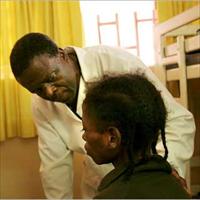SOUTH AFRICA: Cholera in Soweto

Earlier this month the Department of Health in Gauteng Province
confirmed that two people living in the Chicken Farm informal settlement in
Kliptown, an area in Soweto,
had died after contracting the waterborne disease.
"The source of the infection has not been
established, but an urgent investigation is underway to establish the source,
identify and treat possible cases, and ensure no further spread of this
illness," a spokesperson for the provincial health department, Zanele
Mngadi, told IRIN.
Cholera is an intestinal infection causing acute
diarrhoea and vomiting and, if left untreated, can cause death from dehydration
within 24 hours. It is easily treatable with rehydration salts.
Deeper issues
Soweto residents point to deep-seated problems related to poor
sanitation facilities and the lack of access to potable water. Patra Findane,
national organiser for the Coalition Against Water Privatisation (CAWP), a
pressure group agitating for free water for all in Soweto, said many more Kliptown residents
were showing symptoms associated with cholera. Findane said there had been
unconfirmed reports of a third case this week.
A joint statement by CAWP and the Kliptown Concerned
Residents (KCR) read: "While it is a shock to everyone in the community to
lose one of its members, it should not be a surprise ... the government's
neglect of pleas for emergency intervention to combat the social and environmental
crisis makes it fully responsible for her death." The statement was issued
after members of the groups had visited the family of one of the two confirmed
cases of cholera.
"Residents live in fear as they wonder who is
next," the statement commented. "Despite all efforts undertaken by
the poor residents of Kliptown to get its attention, the City continues to turn
a blind eye."
Findane said local government's failure to adequately
improve basic services delivery to a neglected township that is more than 100
years old had likely been the main contributing factor to the outbreak of the
disease.
The informal settlements of Soweto have no sewage or drainage systems and
the bucket system of human waste disposal is still widely used, despite
promises by the government that the practice would be eradicated by the
beginning of 2007.
Failing to isolate the source
Last week Johannesburg Water, the local utility, said
the results of recent tests of the area's water supply confirmed that
Kliptown's water was cholera-free and safe to drink.
Municipal spokesperson Baldwin Matsimela said the City
of Johannesburg's
Environmental Management System, which is part of Johannesburg Water and is
responsible for sampling and monitoring surface water, took samples in Kliptown
on 28 March and 8 April.
The samples tested negative for cholera on both
occasions, and more samples were taken on 11 April but tests on these were also
reported as negative for cholera.
"In addition, drinking water samples were taken
from the informal settlement in the Kliptown area and the results were cleared
of any contamination," Matsimela said.
Findane doubted this. "They say there is no cholera
here, but all over Kliptown there are posters and field-workers from different
local clinics warning people about the threat of cholera infection. So why
should we believe the current cholera outbreak has nothing to do with terrible
conditions the people live in, and that it is not a big problem?" he
asked.
The CAWP has called on the Department of Water Affairs
and Forestry, the Department of Health and Johannesburg Water "to
immediately act on the crisis in Kliptown. Without water and sanitation more
people will continue to fall ill in this community."
 Back and Next - Back and Next
Back and Next - Back and Next See Also - See Also
See Also - See Also